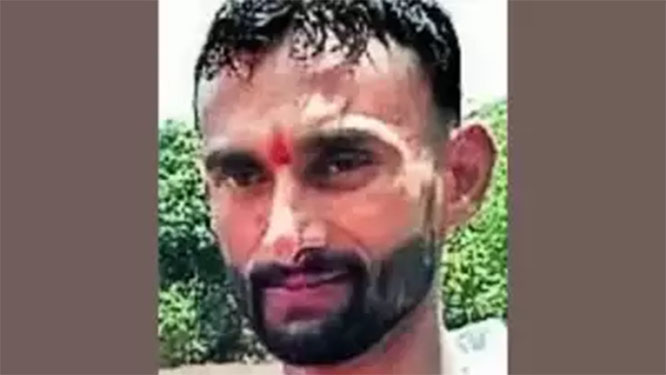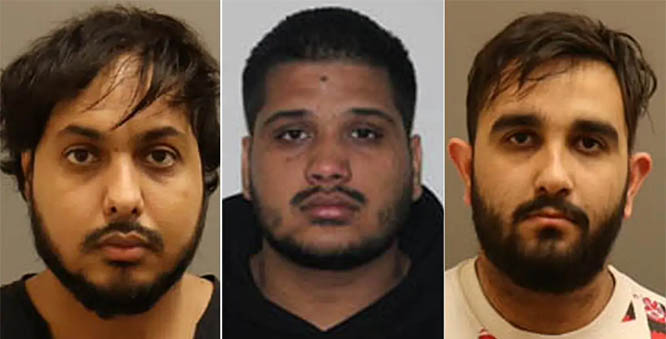
Normal life was hit as farmers blocked highways, roads and squatted on railway tracks at many places in Punjab and Haryana on Monday in view of a "Bharat Bandh" called by farm unions against three agriculture laws of the Centre.
In Punjab, the ruling Congress said it firmly stands by the farm unions' "Bharat Bandh" call against the three contentious laws.
A complete shutdown was observed in the state, with transport services suspended during the bandh period, while shops and other commercial establishments remained shut at most places.
National and state highways in several districts, including Amritsar, Rupnagar, Jalandhar, Pathankot, Sangrur, Mohali, Ludhiana, Ferozepur, Bathinda, were blocked by the protesters.
In neighbouring Haryana, the protesters blocked highways in Sirsa, Fatehabad, Kurukshetra, Panipat, Hisar, Charkhi Dadri, Karnal, Kaithal, Rohtak, Jhajjar and Panchkula districts.
The protesting farmers squatted on railway tracks at many places in the two states.
Ferozepur's Divisional Railway Manager Seema Sharma told PTI that some passenger trains have been cancelled while some other services have been rescheduled.
With the protesters squatting on railway tracks, she said as far as possible, the railway authorities try to halt the trains at a station so that the stranded passengers can get some facilities.
Farmers squatted on railway tracks at many places in the two states, including at Shahbad near Kurukshetra, Sonipat, Bahadurgarh, Charkhi Dadri, Jind, Amritsar, Patiala, Barnala and Lalru near Derabassi.
Several trains were held up due to this.
Phagwara Station Superintendent Devinder Singh said the Amritsar-bound 03005 Up Howrah Mail coming from Kolkata was stopped by the railway authorities at 6.35 am, while the Jammu-bound 08237 UP Begampura Express had to be halted at Phagwara at 6.46 am.
He said though the Begampura Express had no scheduled halt at Phagwara, it had to be stopped due to track blockade near Jalandhar.
The Amritsar-Katihar Express, the Saharsa-Amritsar Express, the Uchahar Express trains were halted at the Ambala Cantonment railway station, while the Ambala-Saharanpur passenger train was halted at the Jagadhri railway station.
At the Karnal railway station, the Swaraj Express train headed to Jammu was halted.
Three trains were also halted at the Kurukshetra railway station, officials said.
Punjab Chief Minister Charanjit Singh Channi urged the Centre to repeal the three "anti-farmer" laws.
"#I Stand With Farmers & appeal the Union Govt. to repeal the three anti-farmer laws. Our farmers have been struggling for their rights since more than a year & it is high time that their voice is heard. I request the farmers to raise their voice in a peaceful manner," he said in a tweet.
State Congress chief Navjot Singh Sidhu said the PPCC firmly stands by the farmer unions' "Bharat Bandh" call.
"Punjab Pradesh Congress Committee firmly stands by Farmer Unions demand for Bharat Bandh on 27 Sept 2021. In the war of right and wrong you can not afford to be neutral!! We urge every Congress worker to fight with all their might against the three Unconstitutional Black Laws!!" he tweeted.
Hundreds of farmers blocked the Ambala-Delhi National Highway. They put barricades on the roads leading up to the Shambhu border near Ambala and squatted in the middle of the road. The traffic towards Delhi was diverted to alternative routes.
A large number of trucks and other vehicles were stranded on both sides of the highway.
A number of farmers gathered at the new grain market in Ambala city, from where they marched towards various city markets to request the shopkeepers to keep their shops closed.
Most of the grain markets of Ambala district, the wholesale cloth market, Sarafa bazaar, educational institutions and several commercial establishments remained closed.
Shops also remained shut at some other places in Haryana, including in Karnal and Kurukshetra.
In Amritsar, a large number of farmers held a protest near the Golden Gate, the entry point of the holy city.
Farmer leader Sarwan Singh Pandher said the Centre should repeal the "black farm laws" without further delay.
The Samyukta Kisan Morcha (SKM), an umbrella body of over 40 farm unions spearheading the agitation, had earlier appealed to people to support the bandh.
The bandh will be held from 6 am to 4 pm during which all government and private offices, educational and other institutions, shops, industries and commercial establishments as well as public events and functions will remain closed or suspended throughout the country, it had said.
All emergency establishments and essential services, including hospitals, medical stores, relief-and-rescue work and people attending to personal emergencies, will be exempted, it had added.








Comments
Add new comment